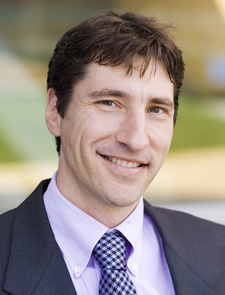Scientists contemplating their next research project tend to focus on how their work will advance their chosen field of study. Increasingly, however, funding agencies also want them to explain how the their work will benefit society in general. UC Santa Cruz has established a Broader Impacts Office to help researchers learn about, plan, and carry out activities that will broaden the impact of their research.
The UCSC Broader Impacts Office is a pilot project funded by the Office of Research and the deans of Physical and Biological Sciences, Baskin School of Engineering, and Social Sciences. The office assists researchers with the preparation of high-quality broader impacts statements for all federal agencies, with an initial emphasis on National Science Foundation (NSF) grant applications.
Like other funding agencies, NSF continues to raise the bar in terms of broader impacts requirements and increasingly expects researchers to make extra efforts to broaden the societal impact of their research activities, according to Elijah Mermin, director of the Broader Impacts Office. The new office can help researchers understand and meet those requirements, which have become increasingly important in determining which proposals get funded, he said.
"We can clarify NSF's expectations for how to fulfill the broader impacts requirements. In addition, we can offer ideas and strategies to help faculty create their own activities or connect with existing programs that address the requirements," Mermin said.
The Broader Impacts Office pilot project is the first of several planned initiatives by the Office of Research to provide greater research development support campus-wide, said vice chancellor for research Scott Brandt. "As government funding for basic research has fallen, federal agencies must increasingly justify their budgets in terms of their benefit to society. They need researchers to help them make that case by explaining their own research in those terms," Brandt said. "The UCSC Broader Impacts Office will help investigators understand these requirements, learn about and connect with broader impact activities already in existence campus-wide, and develop their own broader impact plans and programs to both optimize the success of their proposals and maximize the impact of their research."
Broader impacts may be accomplished through the research itself by, for example, leading to a solution for a real-world problem, such as developing new techniques to ecologically restore degraded forests. Other activities related directly or indirectly to the research can also meet NSF's goals for broader impacts. For example, faculty research that includes undergraduate students from groups that are underrepresented in the sciences can meet the goal of increasing the participation of women and minorities in STEM fields (science, technology, engineering, and mathematics). Broader impacts can also be achieved through outreach to K-12 schools to improve STEM education and teacher development, outreach activities to increase public scientific literacy, and partnerships with industry.
"We're excited about helping researchers put their own creative twist on established programs here at UCSC and beyond, such as the Science Internship Program, in which local high school students conduct research in UCSC labs during the summer. We're also looking forward to helping researchers draw on education and outreach literature to design and support their broader impacts projects," said Broader Impacts Office coordinator Kristin McCully.
The Broader Impacts Office is working to build partnerships with programs on and off campus that can help faculty address the broader impacts requirements. The office will collect and share information about broader impacts trends and best practices, and will also find ways to bolster broader impacts programs on campus so that these programs can more capably assist researchers at the proposal stage, Mermin said. Mermin and McCully have already met with and described on the website more than 20 organizations on and off campus that are interested in collaborating with researchers on broader impacts statements and activities.
In addition to directing the Broader Impacts Office, Mermin is the UCSC environmental sciences grant coordinator, specializing in NSF research and education grants. McCully earned her Ph.D. in ecology and evolutionary biology from UCSC in 2013, with a focus on science education.
For more information, visit the Broader Impacts Office web site.



